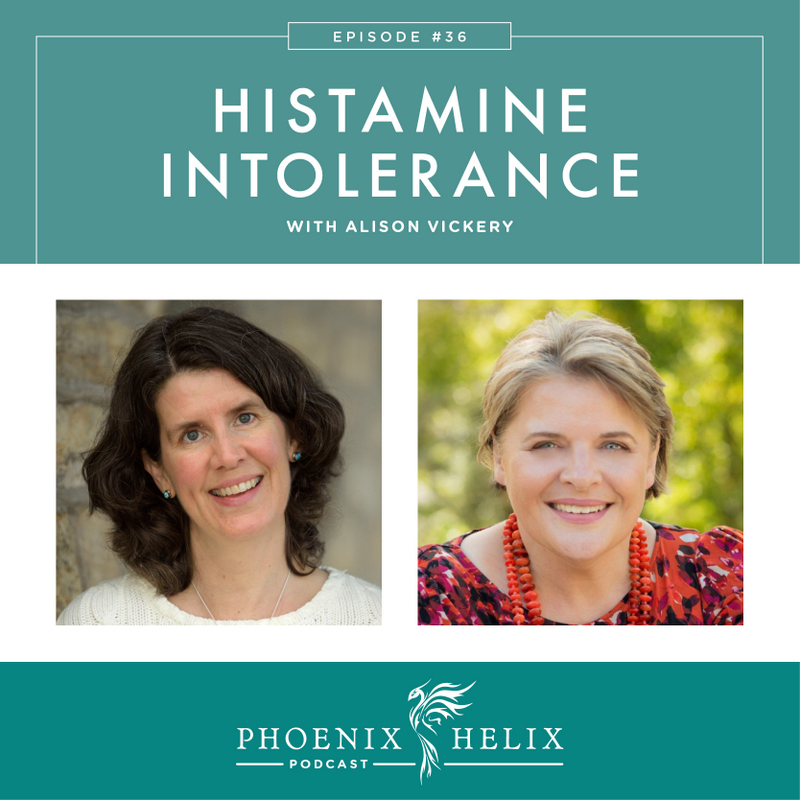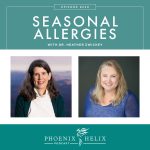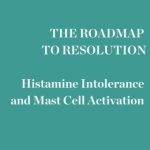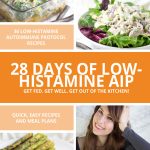
Is This a Missing Piece in Your Autoimmune Healing Puzzle?
Do you have unexplained skin rashes, headaches, digestive upset, mood issues and brain fog, even though you are following the paleo autoimmune diet and lifestyle perfectly? Our podcast topic today might be a piece in your healing puzzle.
Histamine is a natural component in both our food and our bodies, but certain things can make it overproduce, causing myriad symptoms that keep our body in a hypersensitive state. Today, we talk with histamine expert, Alison Vickery, on what causes histamine intolerance, and what we can do about it.
Listen to the Show
- Subscribe to my podcast through your favorite podcast app: iTunes, Stitcher, Google, TuneIn, Spotify, Amazon, etc.
- You can also listen to the episode right here through the player below, and if you subscribe to my newsletter you’ll get notified of future episodes.
Podcast: Play in new window | Download
Show Notes
- Intro (0:00)
- Vote for Phoenix Helix in Paleo Magazine’s Best of 2015 Contest and Enter the Giveaway! (1:36)
- Update: The giveaway has ended and the winner was Amy Tam! Thank you for your votes!
- Meet Alison Vickery (3:43)
- She is a Certified Health Coach who specializes in Histamine Intolerance and works with people around the world via Skype.
- Alison understands Histamine Intolerance from personal experience, having battled it herself. Her symptoms go back to her childhood and reached a crisis point in 2008. As a child and young adult, she “lived with” her symptoms (hives around her mouth, painful menstrual cycles, welts after bug bites, headaches, and moodiness). She simply avoided the foods that she knew didn’t agree with her. In 2008, a combination of the hormonal shift of perimenopause and some medication reactions caused her problem to become acute. Her symptoms expanded to include insomnia, chronic anxiety and depression, chronic muscle pain, fatigue, dizziness, cardiac arrhythmias, blood pressure issues. She even had to be admitted to the hospital. Alison met with an immunologist who informed her she was being poisoned by histamine and taught her how to address it through diet and lifestyle. Two years later, the vast majority of her symptoms were gone, along with most of her food sensitivities. She has dedicated her professional practice to helping others heal in the same way.
- Histamine Intolerance Basics (15:23)
- Histamine is a normal part of the body’s function. There is a common analogy used for histamine intolerance – the bucket. Normally the body can respond and adjust to the amount of histamine until the bucket overflows and becomes off balance.
- The #1 cause of histamine excess: fermentation and deterioration of foods.
- So much of histamine intolerance can be resolved by addressing the quality of food, not by removing foods altogether.
- Our bodies are designed to diffuse the excess histamines. If you have a genetic condition where you have reduced enzymes or you have gut issues, you may be producing insufficient diamine oxidase (DAO). Research shows that DAO deficiency is the leading cause of histamine intolerance.
- About 50% of excess histamine is metabolized in the gastrointestinal tract, the rest is metabolized by a second enzyme called Histamine N-Methyltransferase (HNMT) which is mostly produced in the liver as part of the methylation process.
- All of these enzymes depend on co-factors; vitamin B6, zinc, vitamin C, and copper deficiencies, for example, can have an effect on those enzymes’ function.
- How Is It Diagnosed? (28:18)
- The gold standard is a blood test to determine the level of DAO function you have and from there, implement a low-histamine diet and see what effect that has on your DAO level, and then re-test in two weeks.
- Alternatively, for those unable to have testing done, an elimination diet with food challenges.
- If you go on a low-histamine diet, and your symptoms or levels don’t improve, then you don’t have histamine intolerance. In this case, Alison finds that SIBO is often the problem instead.
- Is There a Cure for Histamine Intolerance? (31:30)
- It depends on where you are on the spectrum. If you have a genetic deficiency (DAO or HNMT) or cell changes through mastocytosis, you can improve the situation but not cure it.
- If it’s caused by something else like SIBO or hormone imbalance, once those are addressed, the histamine intolerance will resolve simultaneously.
- A low-histamine diet is symptom relief. Delve deeper to find the root cause of your histamine intolerance.
- Symptoms of Histamine Intolerance (34:34)
- Alison describes it simply as “metabolic chaos”.
- The skin is intricately involved in histamine reactions; ranging from psoriasis and eczema, to hives and extreme reactions to insect stings.
- There is nearly always a gut-based reaction; ranging from food sensitivities, heart burn to acid reflux, nausea or IBS, etc.
- There is also nearly always a neurological component because histamine is a neurotransmitter: blood pressure, arrhythmia, brain fog, poor memory, fatigue, or specific moods.
- Your body is working hard to protect you. Your body is not turning against you.
- Low Histamine Diet (38:05)
- The diet is a short term way to diagnose and reduce symptoms while determining the root cause. It isn’t a long-term solution.
- Eat whole foods, and always read labels. For example, if you buy olive oil you have to make sure it is 100% olive oil (and olive oil fraud is rampant). Coconut milk is another example of something often full of additives.
- Buy it fresh. Cook it fresh. Eat it fresh. Histamines naturally build in food through deterioration and aging, so you have to be careful with leftovers. Put them in the freezer instead of the fridge – that will retard histamine growth.
- Don’t buy into a “no-food diet”. Whole, real foods go a long way with resolving histamine issues. Nutrient density is important to healing. In Alison’s experience, most people with histamine intolerance can eat the moderate and low histamine foods freely, only avoiding the high histamine foods. It’s only the most severe cases that might need to temporarily be more strict.
- The highest histamines foods are: aged meat, fermented foods, cheeses, vinegar, alcohols.
- There are also foods that work as anti-histamines.
- See Alison’s article for more information: Which Food List To Use?
- Stress and Histamine Levels (47:04)
- Stress is strongly linked to mast cell activation and the progression of histamine intolerance to the more advanced forms on the spectrum. Biologically, it involves the hypothalamic–pituitary–adrenal axis (HPA axis).
- Alison recommends the DUTCH test to assess HPA issues.
- Don’t wait until you are under stress to try to manage it. Instead, make stress management a regular part of your life. Alison recommends Self-Compassion and Emotional Freedom Technique (EFT).
- Hormones and Histamine Intolerance (50:23)
- Hormones directly affect histamine levels. Estrogen is known to be histamine releasing, while progesterone is known to be histamine degrading.
- Not only that, but histamine levels affect hormones as well. It’s a cycle.
- Diagnosing and correcting hormone imbalances is a key part of any histamine healing protocol.
- Supplement Recommendations (51:38)
- There are certain precursors to the efficient function of enzymes, so looking at vitamin C, zinc, and B6 can be helpful.
- Also, flavonoids, antioxidants, and quercetin can be helpful for mast cell activation specifically.
- DAO enzyme supplements can help if you have a faulty DAO enzyme.
- It can also be helpful to look at mineral levels, especially magnesium and potassium.
- Lastly, probiotics are helpful if you have gut issues. It’s important to ensure the probiotics are a histamine lowering strain (because there are probiotics that actually raise histamine as well). One AIP-friendly, histamine-lowering brand is Smidge (formerly called GutPro).
- Resources
- She has also written a series of low-histamine e-cookbooks.
- A Paleo AIP Low-Histamine Meal Plan is available from Christina Feindel.
- Alison also works 1:1 with people around the world. You can connect with her through her website.
- Outro (58:44)
- Eileen (your podcast host) is the author of multiple books, written to help people thrive with autoimmune disease. Learn more on the Books Page.
- If you like this podcast, follow or subscribe through your favorite podcast app. You can also subscribe to Eileen’s biweekly newsletter.
- Check out the entire archive of podcast episodes.
You May Also Be Interested In
Spreading the Word
If you like the podcast, please leave a positive review in iTunes. It would mean the world to me, and also helps others find the podcast. Here are some quick instructions using your iPhone:
- If you are already subscribed to my podcast: (1) Click the purple podcast icon. (2) At the bottom of the screen, click Library. (3) At the top of the screen, click Shows. (4) Click the Phoenix Helix podcast image. (5) Scroll down the page, and you’ll see Ratings and Reviews. Scroll down a little bit more and click on Write a Review. This will bring up the review screen. Tap 5 stars (if you love the podcast), and then click in the title box, and it will bring up the keyboard. Enter a title and short review. (6) Click Send in the upper right corner. (7) Thank you! Positive reviews give the podcast a higher search ranking in iTunes, helping people find it and letting them know it’s a quality podcast and worth their time to listen.
- If you haven’t subscribed to my podcast: (1) Click the purple podcast icon. (2) In the lower right corner, click the magnifying class. (3) Type Phoenix Helix in the search box. (4) Click the podcast cover in the Show list. (5) If you’d like to subscribe, click the + sign at the top of the screen. (6) To write a review, scroll down the page, and you’ll see Ratings and Reviews. Scroll down a little bit more and click on Write a Review. This will bring up the review screen. Tap 5 stars (if you love the podcast), and then click in the title box, and it will bring up the keyboard. Enter a title and short review. (7) Click Send in the upper right corner. (8) Thank you! Positive reviews give the podcast a higher search ranking in iTunes, helping people find it and letting them know it’s a quality podcast and worth their time to listen.








Thanks for the info. Being recently diagnosed with mastocytosis has created havoc in my life. Even though I don’t have an autoimmune disease but rather a genetic disorder, I have found that the AIP lifestyle has helped manage the symptoms but all of those healing fermented foods are now out. So is cooking ahead since left overs are now a no no. I’ve been trying to figure out how to manage it all.
It’s definitely a learning curve, Lisa, but hopefully this podcast will help. Frozen leftovers are a possibility, thankfully. Wishing you wellness in every way.
I have been listening to podcasts by a number of people in the AIP community and I would like to say that yours are the most informative that I have found. Thanks so much Eileen for this valuable store of info.
Thanks, Margaret! It’s a passion project for me, for sure.
Thank you so much for this Eileen, I am just finding this now as a member on our UK AIP Facebook support group kindly posted this podcast. I have been struggling with histamine issues since October 2015. I am also low fodmap and not been able to reintroduce any AIP foods. I am very stressed and peri menapausal. Will look up EFT and probiotics now! I have Pyroluria and severe RA and am working with a functional med practitioner. I find your work very motivational. Keep up the good work.
Kirsten, you have a lot going on! I’m so glad you’re working with a practitioner and that this podcast gave you some new insights. Wishing you wellness in every way. Gentle hugs to you.
I have noticed that a lot of the high histamine foods are also high in Oxalates. Have you any information on the histamine /oxalate connection?
Hi Yvonne. My understanding is that oxalate liberates histamine, which may be why there is so much crossover between lists.
Thank you Eileen! Have been AIP for two years and was still having problems. Listened to this the first time the day it posted and then life got busy and I seemed to do better. Now with spring in full swing I am a mess. Yep, just into the doctor and after a chat and loads of new blood work, Histamine Intolerant. Explains SO much. Still a crap deal, but thanks to you and Allison I knew right where to go for more information. Keep doing what you are doing! Very thankful here.
Liz, I’m so sorry Spring caused your histamine bucket to overflow, but I’m so happy that this podcast provided you with the knowledge you need to reverse it. I’m also impressed with your doctor for even knowing what histamine intolerance is! You’ve got this!
Oh my goodness! What a wealth of info. I have a kiddo with a severe histamine intolerance and there is more info condensed here than I have seen on a lot of separate sites elsewhere. Thank you for outlining the talk for this busy Momma! I am definitely going to look up Allison.
I’m so glad the show notes were helpful, Laura! Wishing you and your child wellness!
I had a skin prick test and did not respond to the histamine control. I was not taking any drugs that may have altered the results. Could this be a dietary problem?
Hi Becky. That would be a good question to ask Alison via her website, which is listed in the show notes above.
Thank you Eileen. Once again a wealth of interesting information.
Please remind me where and when you will post the winners of the raffle? Thanks.
Alice, you can always trust that if you’re the winner, you will be emailed directly. As for announcing it publicly, I always update the original posts, so you can check back to see who won. Good luck!